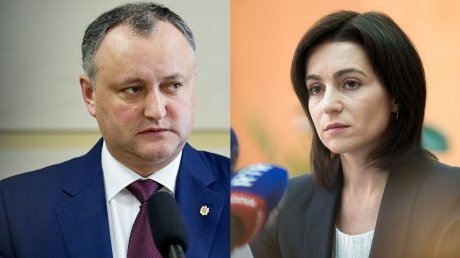Moldova’s presidential election will go to a run-off on November 13 after pro-Russian candidate Igor Dodon narrowly failed to secure a majority of votes.
With almost all ballots counted, Igor Dodon won 48.5%. His closest rival, pro-European candidate Maia Sandu, has 38.2%.
Igor Dodon needed at least 51% to avoid a second round.
October 30 poll was the first direct presidential election in Moldova for 20 years.

It is seen as a battle between those supporting closer ties with Russia and those wanting integration with the EU.
With turnout put at about 48%, Maia Sandu said young people had been “impeded” from voting, but gave no details.
“Today the young had a small turnout. I think it happened because the authorities impeded them from doing so. We will do everything to remove such obstacles in the second round,” she said.
Igor Dodon thanked his supporters, adding: “The main conclusion is that voters no longer believe in this government. Our victory is inevitable.”
PM Pavel Filip said in a statement that he hoped the result of the run-off would “bring about both change and stability”.
Moldova, an ex-Soviet republic, is one of the poorest countries in Europe and has been hit by a string of high-profile corruption scandals.
Since 1996 presidents of Moldova have been chosen by parliament.
Both the EU and Russia seek greater influence over Moldova, which is wedged between Ukraine and Romania, but polls indicate that voters are divided about which offers them a better future.
Igor Dodon has pledged to push for new parliamentary elections if he wins. Maia Sandu, from the center-right opposition, has been praised for reforming the education system.
In Moldova, the president appoints judges and sets out foreign policy but other major decisions need the approval of parliament.
Popular election though could bring the post more influence and authority, correspondents say.
Moldova was thrown into political turmoil in 2014 with the vanishing of about $1 billion from the banking system.
There were weeks of street protests and six prime ministers took office in one year.
Since then, parliament has passed anti-corruption laws, forcing public officials to disclose their assets and making the misuse of EU funds a criminal offence.
https://www.youtube.com/watch?v=4xym3GAtmfQ
